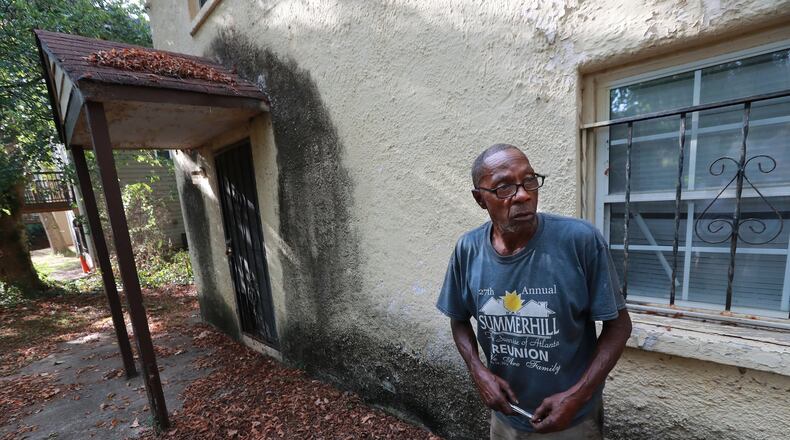For the past nine years, Cris Eix has had to contend sewage backup in her Peoplestown home after even a brief rain shower.
“It can rain for 15 minutes and I’ll have brown water coming up my tub and toilet,” she said. “It’s not safe and it’s a health hazard.”
Eix and several other Peoplestown residents want the city to deliver on its promise to install a park and retention pond to stop the flooding they’ve been dealing with for years.
“I’m tired of them making promises and not delivering,” Eix said.
Flooding in Peoplestown is a familiar problem for many of its residents and the city. After 2012’s severe floods overwhelmed the drainage system in the area, several residents sued the city claiming the sewer system was not maintained. But even before then, the city was bombarded with lawsuits from residents across the city complaining of flooding caused by poor sewer management.
Longtime resident Perry Holloway said the neighborhood flooding has been an issue his entire 67 years. He owns two homes on South Avenue, including one so severely damaged by flooding the basement is unlivable.
“It just shows you how high this water gets,” Holloway said, showing a reporter mold reaching a foot high along the side of the home. On very rainy days, “this backyard is like a swimming pool back here.”
PREVIOUS COVERAGE:
In the midst of the city’s efforts to fix the flooding has been a years-long legal fight with four Peoplestown residents who want to keep their homes that the city seized using eminent domain in 2014.
In 2014, Atlanta City Council approved a plan that would allow the city to buy homes and convert the land into a park and retention pond to stop flooding. The $65 million plan, dubbed the Southeast Atlanta Green Infrastructure Initiative, is a series of projects to provide sewer capacity relief in the Peoplestown, Summer Hill and Mechanicsville neighborhoods. Repeated flooding occurred because the city under-planned and overbuilt that part of town, where two streams converge underground.
But shortly after the city used its power of eminent domain to take the homes, public protests began. The four homeowners who claimed flooding had not affected their properties, fought back in court. Their suits have stalled since late 2018, and recently the city council discussed potentially settling the case by letting those four stay in their homes.
Despite the lawsuits, some of the work on the flood management plan has gone forward.
So far, the city has installed eight green projects that can absorb floodwater runoff. They can hold 340,000 gallons of sewer runoff, according to a spokesperson with the Atlanta Department of Watershed Management that oversees the city’s sewer and water distribution system.
The city also has built a vault that holds 5.9 million gallons of runoff underneath the media parking lot at the former Turner Field. Permeable pavers that catch stormwater runoff were installed along a four-mile stretch of Atlanta Avenue.
Another portion of the project called for a retention pond in Peoplestown and another vault installation in the Summer Hill neighborhood, but Watershed spokeswoman Christina Cruz-Benton said a construction start date has not been set for either project. She said property is still being acquired.
The city would not say if the pending lawsuits are holding up the work.
Plans called for the pond to sit in the block where the four residents are fighting to keep their homes. The issue reignited last month when two city councilmen proposed a resolution that would allow the city and residents to end the ongoing suit.
The legislation was discussed in the city’s utilities committee meeting, but not voted on. No movement has been made on it since.
For some residents, such as Matthew Keller, the flooding has made it difficult to sell their homes.
Keller, 33, stays on the edge of Summer Hill and Peoplestown. He bought his home as an investment opportunity. “The home was in a dilapidated state,” he said. “It was a former rooming house and the city had shut it down. I saw an opportunity to restore it to its former glory and enjoy it as a 1920s craftsmen bungalow that I wanted to adore.”
Now, the idea of selling the home makes Keller nervous.
“At the end of the day, I feel like the stalled out (flooding) project is adversely affecting my resale value,” he said. “Even if I wanted to, I couldn’t get what the home is worth because now I’ve got derelict fields by the city that have sewage runoff.”
Eix is in the same boat: “I can’t sell it, I can’t lease it, and living here is hard with the flooding.”
Residents said real estate agents still sell people homes in the neighborhood, showing potential neighbors newly constructed or renovated homes, including one that sold for nearly $590,000 last month. That home sits across from where the retention pond would go.
Holloway said he tells potential home buyers the truth: “It floods back here.”
About the Author
The Latest
Featured



